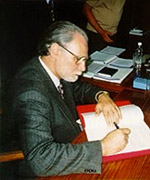
Electronic english version since 2022 |
The newspaper was founded in November 1957
| |
|
Number 23 (4771) |
About what the newspaper wrote on this day
27 years ago
No. 24 (3413), 26 June, 1998
 |
| Signing of the protocol at the Ministry of Science in Moscow |
***
The traditional meeting on the interaction of neutrons with nuclei (ISINN-6) this year turned out to be more accessible for scientists from far, not near abroad. More than 100 theorists and experimenters from research centres in Europe, the USA, Korea and Russia took part in it.
Professor A.Steyerl (University of Rhode Island, USA): "The meeting is always well-organized and of a very high scientific level. Dubna is a special place, as it has always been slightly ahead in many areas of physics. The most interesting research area of UCN is that it has always been and is a traditionally strong area here."
Dr. P.Geltenbort (Laue-Langevin Institute, Grenoble, France): "UCN Physics is a rather specific area and it is engaged literally in several centres of the world. And of course, almost everyone comes to the beams in the ILL, so - "all faces are familiar." But the groups coming to Grenoble usually do not meet each other and at this meeting, they have a great opportunity to jointly discuss their results..."
***
Administrative Director of the Institute A.I.Lebedev commented on the situation with the financing of the Institute and the ensuing consequences for employees, "The situation with the financing of the Institute today is very tense. Although, unlike previous years, countries with debt of two years or more begin to pay."
As for the financing situation today, the payments of the Russian Federation in the second quarter amounted to only a quarter of what it must pay on its financial obligations. And this is only half of our wage bill. Nevertheless, we fully paid off the staff of the Institute for April and paid an advance for May. If in June the money is transferred to the Institute, we will completely pay for May and continue the struggle (it is difficult to find another word) for further transfer of funds. These are very difficult times in the life of our Institute. The reform so necessary to keep it viable began amid financial instability, further complicating its course.
***
The reason for the meeting of the IBR-2 reactor staff with JINR Chief Engineer I.N.Meshkov was sending letters to Directorate from the reactor duty services that demanded payment of full salary for May and advance payment for June by 19 June. Otherwise, for the next experimental cycle from 22 June, the reactor will not be launched since in the current difficult situation, the shift and repair personnel are not able to ensure the safe operation of the reactor. Having told the participants about the difficult situation at the Institute and the measures taken by Directorate to get out of it, the Chief Engineer expressed the opinion that the IBR-2 staff has a choice: to accept, wait and launch the reactor, or the session will be canceled.
Some issues were not met, such as, why the decision of the checkpoint on the order of priorities is not implemented - salary, basic facilities, business trips. Once again, an attempt was made to explain the fundamental difference between the maintenance of the reactor and other facilities: shift and duty personnel work constantly, regardless of whether the reactor is launched or not. But launching is an additional burden for staff. As the chief engineer of FLNP V.D.Ananiev emphasized, at the recent STC laboratory, a proposal was made to reduce the holding of academic councils and PACs from two to once a year, to reduce the number of foreign business trips. He recalled that in 1987, the Minatom developed measures for nuclear facilities, according to which IBR-2 was equated to 33 of the most dangerous nuclear energy facilities in the USSR.
The participants expressed dissatisfaction with the rare visits of the members of Directorate to them and despite the general difficult situation, the number of banquets and reports. V.D.Ananiev repeated the proposal that had already been put forward several times: to establish a guaranteed salary fund for IBR-2 personnel, for the operators of U-400 and U-400M, independent of external changes.
The result of the meeting is not a draw, rather a common loss, that is, both sides were unconvinced and the next cycle of experiments at the reactor will not take place.
Leading columnist Irina LEONOVICH